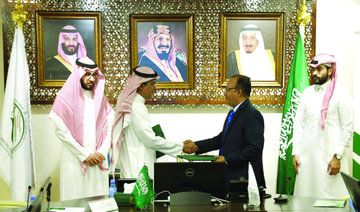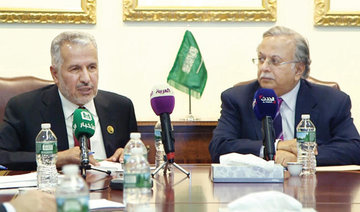WASHINGTON: Abdullah Al-Rabeeah, adviser at the royal court and general supervisor of the King Salman Center for Relief and Humanitarian Aid (KSRelief) recently highlighted the humanitarian efforts and work by the Kingdom represented by the center to help those in need all over the world.
Al-Rabeeah met with representatives of the international and American media at the Embassy of Saudi Arabia in Washington and stressed that the Kingdom provides humanitarian aid without discrimination.
He noted that the Kingdom has helped people in need in 38 different countries on four continents.
The KSRelief chief explained the special role of the Kingdom, represented by the center, in the humanitarian field, its impartial actions and abidance by international humanitarian law that conforms to Islamic Sharia, in seeking to preserve dignity and integrity of those in need and ease their pain.
He said that the country that has benefitted most from the Kingdom’s humanitarian aid is Yemen. Houthi militias have besieged cities and blocked medical and relief items. However, that has not thwarted the center’s pursuit to assist all Yemenis.
Al-Rabeeah talked about the challenges faced by KSRelief operations in Yemen, especially the blockade enforced by armed Houthi militias in many areas, preventing aid from reaching its destination. These militias, he stressed, looted large amounts of aid destined for the Yemeni people between 2015 and 2017, including 65 shiploads of aid and 124 relief convoys.
The Kingdom granted more than $76 million to the Yemeni Ministry of Health, the Yemeni people, the World Health Organization (WHO) and UNICEF, as well as 550 tons of medications distributed through all Yemen’s regions.
Al-Rabeeah noted that the center targeted women and children in Yemen by implementing many projects in the field of education, security, and food and water supplies.
The rate of the spread of cholera in Yemen decreased over time thanks to the center’s efforts, he said.
He also said that the Kingdom has received and assisted Syrian refugees as its guests and supported millions of other refugees in nearby countries, stressing the Kingdom’s concern about the humanitarian situation in Iraq, Somalia and Myanmar.
The head of KSRelief noted that aid provided by the Kingdom in 2014 reached 1.9 percent of the country’s GDP, which exceeded the rate of 0.07 percent decided by the UN. The Kingdom also received refugees from Yemen and Syria and treated them as guests.
Saudi Arabia provides humanitarian aid without discrimination: KSRelief chief
Saudi Arabia provides humanitarian aid without discrimination: KSRelief chief
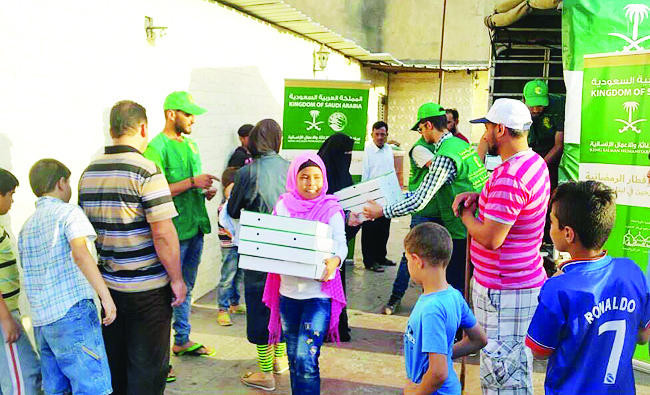
Saudi institute gears up to tackle organized crime

- Riyadh forum pushes for stronger global efforts to combat financial crimes
RIYADH: Legal enforcement agencies must outperform organized crime groups by “miles, not just steps,” to prevent criminal alliances forming and flowing across borders, a major Riyadh forum on combating corruption has been told.
In a speech on “Building Human Capabilities to Fight Corruption and Fraud” delivered at the Arab Forum of Anti-Corruption Agencies and Financial Intelligence Units on Wednesday, Abdulmajeed bin Abdullah Al-Banyan, president of Naif Arab University for Security Sciences, said that developing strategies to fight organized crime “presents a significant challenge for both the creators and enforcers of these initiatives.”
He added: “They must ensure that the individuals they train will gain superior knowledge and skills compared to even the most adept criminal organizations as the crimes in question are intricate in nature, often orchestrated by sophisticated transnational gangs that leverage cyberspace and technology to perpetrate their illegal activities while evading detection.”
Organized crime encompasses terrorist groups, drug trafficking, money laundering, migrant smuggling, and human trafficking.
Naif Arab University for Security Sciences examined specialized training programs in the field of economic crime as part of a survey of the Arab region in 2018 .
“We noticed a shortage in the number and type of programs available compared with other regions of the world,” said Al-Banyan.
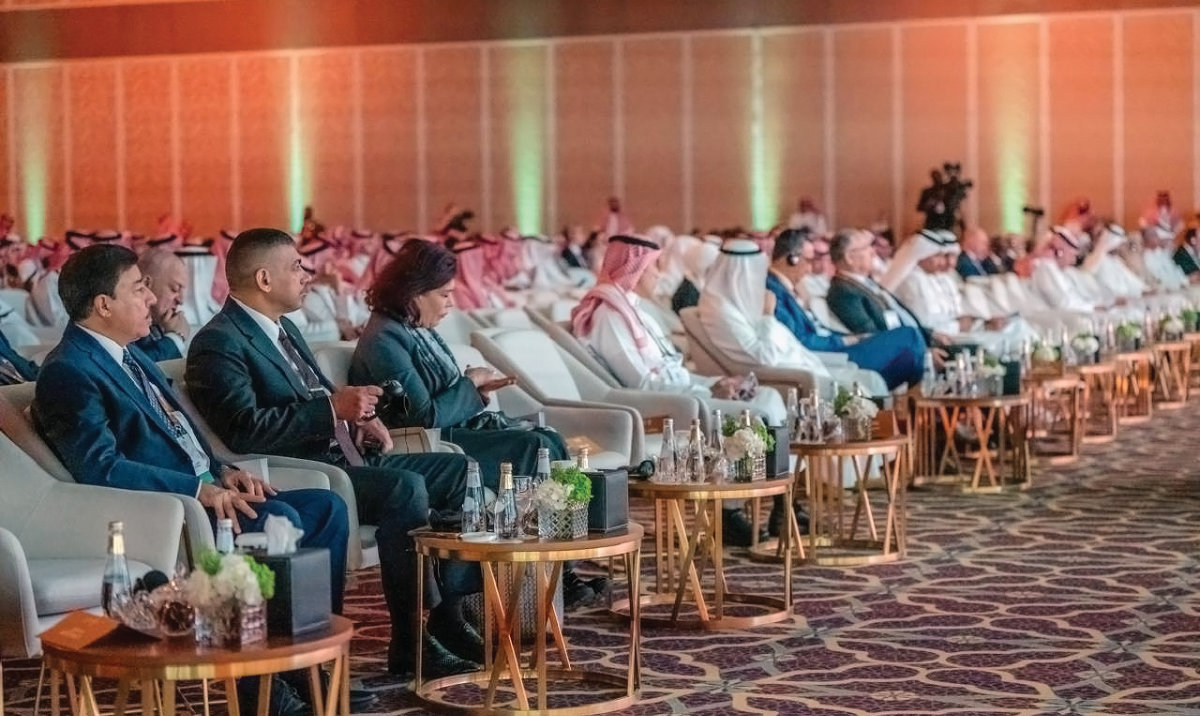
As a result, the university — the scientific body of the Arab Interior Ministers Council — made fighting economic crime one of its main priorities.
“We launched several master’s programs aimed at building capabilities in this field, the most important of which is the master’s program in financial integrity in cooperation with Case Western Reserve University in the US, which specifically aims to prepare experts in combating money fraud,” he said.
The university provides a master’s program in dealing with economic crimes, including corruption and financial fraud, and a master’s program in digital forensic investigation, which focuses on combating cybercrime and suspicious activities online.
NAUSS also launched a new master’s program in artificial intelligence this year, Al-Banyan said.
“We are currently considering adding a new master’s program in forensic accounting, which aims to qualify accountants to detect fraudulent financial practices, and qualifies them to conduct detailed financial investigations and reviews,” he added.
The university signed a memorandum of understanding with the Presidency of State Security in 2016 as part of its efforts to increase its work with key local and international partners.
“We strengthened our relations with the Oversight and Anti-Corruption Authority (Nazaha), and today, we will witness the MoU signing on the sidelines of this forum,” he added.
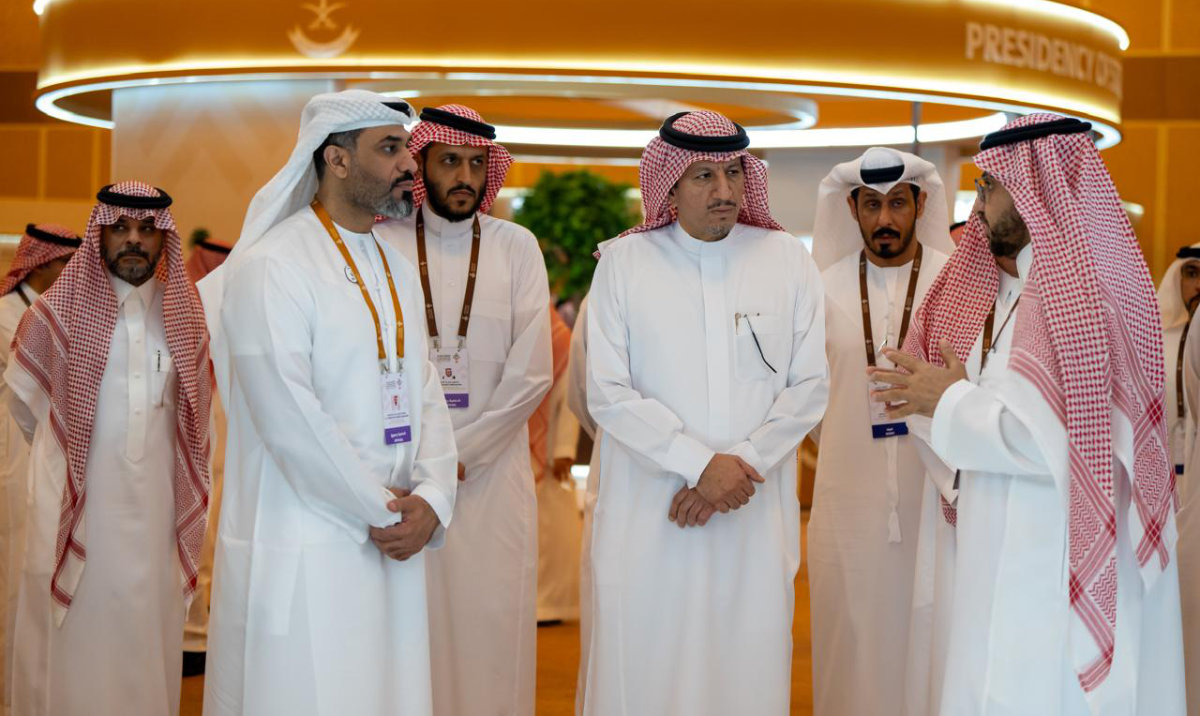
The university has partnered with the United Nations Office on Drugs and Crime, establishing a joint center at its headquarters to support the international and Arab community in combating organized crime, corruption, and money laundering.
Experts highlighted that fighting economic and financial crimes is a complex task that requires clear national strategies and effective cross-border cooperation.
Countries must work together to counter the threat posed by such crimes, which have the potential to severely damage economies and undermine financial systems.
Hassan Mohamud, Somalia’s Minister of Justice and Constitutional Affairs, told the forum that continuing conflict in Somalia has created a “complex money laundering landscape,” making international cooperation crucial for identifying and returning illicit funds.
Speaking during a panel session on “Enhancing Cross-Border Enforcement and Asset Recovery Mechanisms,” Mohamud said that judicial cooperation between countries, and the public and private sectors, is key to addressing these evolving issues.
“The need for sharing information on cross-border flows of money is important to combat money laundering effectively not just in Somalia, but globally,” he said.
In a keynote speech on “National Strategies: Risk Assessment in the Light of Rapidly Changing Realities,” Raed Radwan, head of the Palestinian Anti-Corruption Commission, said: “A national strategy directs efforts and resources fairly and effectively toward achieving specific goals to reduce financial crimes, and enhance integrity and transparency in the financial and economic system.”
He added that citizens have an important role to play in monitoring and reporting crimes, and raising awareness of likely threats.
“Reinforcement training is an awareness-raising activity usually supported by national strategies. It is not limited to employees, but should be available to citizens who wish to acquire knowledge to protect them and make them partners in combating these crimes,” he said.
National strategies also must include a continuous assessment of the risks surrounding financial crimes.
“This basis for evaluation can provide stakeholders with a view of the developments that perpetrators of financial crime can resort to or already resort to,” he said.
Radwan added that political and economic stability are key factors when it comes to halting the rise in financial crimes, which is evident in unstable countries.
“Financial crimes erode trust, affect economic and financial systems, leading to instability in the market, decreased investments, and hindered economic growth, resulting in financial crises,” he said.
Combating corruption and financial crimes is not the task of institutions based on and mandated by law, but is a participatory community task in which various societal sectors participate, Radwan said.
Designer unveils collection inspired by Al-Balad

- Through this collection, we invite our guests to not just wear garments, but to immerse themselves in an experience of a journey through time, culture and elegance: Makram Marzuki
JEDDAH: Saudi designer Makram Marzuki, in collaboration with Al-Balad Hospitality, hosted a captivating trunk show at heritage hotel Beit Jokhdar in Al-Balad on May 14-15.
The event showcased Marzuki’s latest collection, which draws inspiration from the rich cultural heritage of the historic district of Jeddah.
Marzuki’s latest show not only celebrated the beauty of Al-Balad but also offered a glimpse into the designer’s creative process and dedication to preserving Saudi heritage through contemporary fashion.
Speaking about the setting of the show, which emphasized telling the story beind the collection, Marzuki expressed his vision of creating a distinctive shopping experience that resonates with the history and essence of Al-Balad.
“Understanding the psychology of the Saudi woman who values luxury, we recognize her desire for more than just a generic store,” Marzuki said.

“Our goal is to provide an engaging and enjoyable shopping experience where connections are forged and memories are made. Witnessing women greet each other warmly, sharing stories and embracing the fusion of old and new, reaffirms our belief in bringing the past into the future.”
Marzuki revealed that the collection, which features luxurious and refined pieces, is a reflection of the heritage and architectural elements of Al-Balad, such as the intricate designs of “rawasheen” or “roshan,” the patterned wooden frames on windows and balconies.
The designer highlighted the attention to detail and craftsmanship that went into creating each garment, evoking a sense of quiet luxury that aligns with the ambiance of Beit Jokhdar.
“The trunk show and the hotel seamlessly blend together,” he said. “We aimed for an atmosphere of understated elegance, echoing the hotel’s over 100-year-old legacy.”

The designer shared insights into the design process, adding that the collaboration with Samaher Bashammakh from the Royal Institute of Traditional Arts was instrumental in bringing the collection to life as well as ensuring that every detail harmonized with the concept of luxury.
“The result is an intimate and luxurious experience, similar to browsing through a woman’s own closet,” he said. “We wanted to create a space that felt personal, where guests could immerse themselves in the brand’s ethos of sophistication and refinement.”
A white dress crafted from a luxurious cotton-silk blend and adorned with lace details reminiscent of the graceful lines of the roshan exemplified the fusion of traditional elements with modern design, he said. “Through this collection, we invite our guests to not just wear garments, but to immerse themselves in an experience of a journey through time, culture and elegance.”
Speaking about his favorite piece, he said: “The challenge of translating the delicate intricacy of the roshan into velvet jacquard fabric was immense, but the result is truly breathtaking. It’s a testament to the craftsmanship and dedication that went into every detail. This garment symbolizes the fusion of tradition and innovation, and it’s truly fantastic to see it come to life.”
Reflecting on the event, Marzuki emphasized the importance of storytelling in design and encouraged young designers to delve deep into their inspirations to create meaningful collections.
He hinted at a new collection set to launch in October, promising another showcase of exquisite craftsmanship and cultural references.
Digital ID launched for pilgrims arriving from outside Saudi Arabia

- The digital identity service is part of Saudi government efforts to enable digital transformation
- The move aims to facilitate pilgrims’ use of digital identity to enhance quality of services
RIYADH: The Saudi Ministry of Interior on Wednesday launched the digital identity service for pilgrims arriving from outside the Kingdom with a Hajj visa for this year’s season, the Saudi Press Agency reported.
The digital identity service is part of the Saudi government’s efforts to enable digital transformation and harness technology to help people in accordance with the goals of the Saudi Vision 2030.
Developed in cooperation with the Ministry of Foreign Affairs and the Ministry of Hajj and Umrah and the Saudi Data and Artificial Intelligence Authority, the service caters to those performing the annual ritual, according to the Interior Ministry, and enables pilgrims to prove their identity electronically through the Absher and Tawakkalna platforms.
The move aims to facilitate pilgrims’ use of digital identity to enhance the quality of services provided to them and enrich their experience.
It was also launched for pilgrims to experience the highest quality of service, and to keep pace with developments in digital transformation in the services provided to them throughout their stay in Saudi Arabia.
The ministry’s General Directorate of Passports also launched on Wednesday a special passport stamp for those benefiting from the Makkah Route Initiative. The stamp contains the initiative’s visual identity.
The stamp will be made available through designated lounges at 11 airports around the seven countries benefiting from the initiative, which are Morocco, Indonesia, Malaysia, Pakistan, Bangladesh, Turkiye and Cote d’Ivoire.
The Makkah Route Initiative is one of the ministry’s initiatives within the program of serving pilgrims.
Saudi FM meets with Slovenian counterpart

- During the meeting, the ministers discussed ways to enhance cooperation relations between their countries in various fields
RIYADH: Saudi Foreign Minister Prince Faisal bin Farhan received his Slovenian counterpart Tanja Fajon in Riyadh on Wednesday.
During the meeting, the ministers discussed ways to enhance cooperation relations between their countries in various fields and intensify bilateral coordination on issues of common interest.
They also discussed international developments and efforts made in this regard.
Saudi deputy minister of foreign affairs receives Chinese ambassador

Saudi Deputy Minister of Foreign Affairs Waleed Elkhereiji received the recently appointed Ambassador of China to the Kingdom Chang Hua on Wednesday in Riyadh.
Elkhereiji wished the ambassador success in his new duties.
Meanwhile, Saudi Arabia’s Deputy Minister for Consular Affairs Ambassador Ali Al-Yousef received Ambassador of Venezuela to the Kingdom David Caraballo, and they reviewed consular affairs of common interest.


